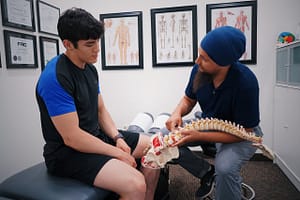Have you been feeling discomfort or stiffness in your spine lately? It might be time to shine a spotlight on the importance of early screening for spinal abnormalities. Early detection is key when it comes to maintaining a healthy spine and preventing further complications down the road. You see, many people ignore their pain and discomfort, thinking it will go away on its own. However, this could be a grave mistake, as spinal abnormalities often progress and worsen over time if left untreated. So, early detection is a must here.
You may need a spine MRI if you are experiencing symptoms such as persistent back pain, numbness, tingling, or weakness in the arms or legs, which could indicate conditions like herniated discs, spinal stenosis, or spinal tumors. For more detailed information, visit Biomed Scan’s guidance on RMN coloana. In fact, early detection using spinal imaging techniques such as MRI can help identify these conditions even before symptoms appear. But there is more to it. Here are some reasons why early screening is essential for spinal abnormalities/
Preventing Further Damage
 Identifying issues at an early stage allows for timely intervention and treatment, potentially halting the progression of conditions that could worsen over time. By catching abnormalities sooner rather than later, healthcare providers can implement appropriate strategies to address the root cause of the problem. This proactive approach can help mitigate potential complications that may arise if left untreated. Moreover, taking action promptly can prevent minor concerns from escalating into more serious issues that may require extensive treatment or even surgery.
Identifying issues at an early stage allows for timely intervention and treatment, potentially halting the progression of conditions that could worsen over time. By catching abnormalities sooner rather than later, healthcare providers can implement appropriate strategies to address the root cause of the problem. This proactive approach can help mitigate potential complications that may arise if left untreated. Moreover, taking action promptly can prevent minor concerns from escalating into more serious issues that may require extensive treatment or even surgery.
Crafting a Better Pain Management Strategy
Living with spinal abnormalities can often mean dealing with chronic pain on a daily basis. Crafting a better pain management strategy is crucial in improving the quality of life for those affected by these conditions. But once you’ve gone through a spinal MRI scan and intervention, healthcare providers can set up personalized treatment plans and strategies that target the root cause of the discomfort. The treatment usually combines physical therapy, prescribed medication, and alternative therapies ranging from acupuncture to chiropractic care. All of these will help individuals find relief from their symptoms. Just be sure to work closely with medical professionals to tailor a plan that suits each person’s unique needs and preferences.
Preserving Mobility
Spinal abnormalities, if left untreated for quite a while, can lead to immobility. In other words, they can easily limit how you move your body and hinder your quality of life. That’s why if you seek the right treatment following an MRI scan, you can maintain good movement and flexibility. You see, mobility impacts every aspect of daily life, from simple tasks like getting out of bed in the morning to more complex activities like playing sports or dancing.
Avoiding Invasive Surgery
 When it comes to spinal abnormalities, avoiding invasive surgery should be a top priority. Early detection plays a crucial role in steering clear of more aggressive treatment options, such as surgeries that involve significant risks and longer recovery times. Opting for early screening can help identify spinal issues before they escalate to a point where surgical intervention becomes necessary. By catching abnormalities in their early stages, patients have the opportunity to explore less invasive treatments like physical therapy, chiropractic care, or medication management.
When it comes to spinal abnormalities, avoiding invasive surgery should be a top priority. Early detection plays a crucial role in steering clear of more aggressive treatment options, such as surgeries that involve significant risks and longer recovery times. Opting for early screening can help identify spinal issues before they escalate to a point where surgical intervention becomes necessary. By catching abnormalities in their early stages, patients have the opportunity to explore less invasive treatments like physical therapy, chiropractic care, or medication management.
Invasive surgeries not only pose potential complications but also require extensive rehabilitation periods that may impact daily activities and quality of life. By addressing spinal problems proactively through early detection methods, individuals can potentially sidestep the need for invasive procedures altogether. Prioritizing regular screenings and taking proactive steps toward maintaining spinal health can significantly reduce the likelihood of facing the prospect of undergoing complex surgeries down the road. It’s all about safeguarding your well-being by staying informed and attentive to any signs or symptoms that warrant medical attention.
